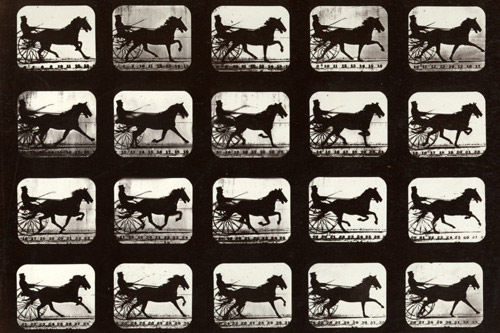Gallery
Fixing the Shadows
Motion Study Eadweard Muybridge © Stanford University
Eadweard Muybridge's famous 'Motion Studies' was the product of the wealth and the whim of the railroad baron, Leland Stanford. Stanford came to Muybridge because he had a rich man's problem. A passionate race horse breeder, he wanted to prove that a horse lifted all four feet off the ground when it trotted - something that had evaded human perception for millennia.
On a specially whited out section of track, Muybridge placed a row of 24 cameras with electric shutters, which would be triggered in sequence, four every second, as the horse passed by. By this means, Muybridge did more than freeze the moment; he took a scalpel to time itself.
"Muybridge's photographs were the first source of accurate information about the gait of a horse, and it's the beginning of this change where suddenly the camera allows human beings to see faster than our own eyes, to break down the world and dissect motion. It's part of that intrusion into the flow of time. For Stanford, the project was always about horses, whereas Muybridge understood that this was potentially about everything he could possibly find and really create an encyclopaedia of zoological motion."
Rebecca Solnit (writer)
Extract from 'Fixing the Shadows', Genius of Photography (Wall to Wall) Click here to see clips from this episode
Fixing the Shadows
|
